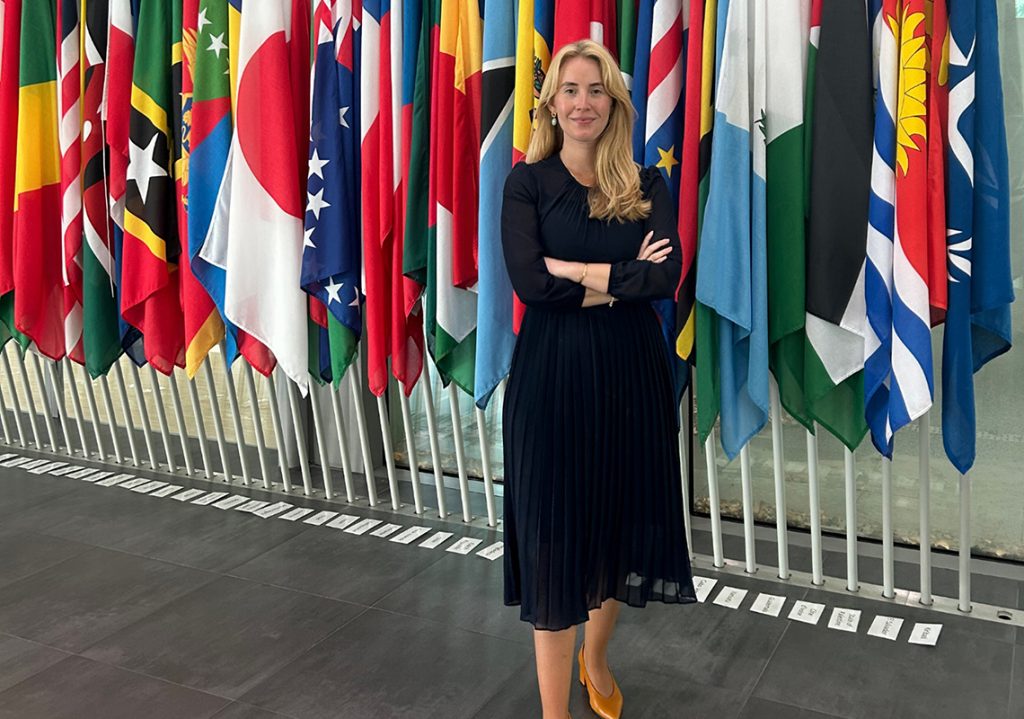Before enrolling at Boston College Law School, Ainsley Hutchison ’25 spent more than ten years gaining government and diplomatic experience in New York, Washington, DC, and London. She worked at the United Nations, the US Embassy, and the British Embassy. Throughout her tenure, she led the UK Government strategy on International Appointments ensuring high-quality leadership at the UN and dealt with issues regarding gender parity, sexual exploitation, abuse, and harassment.
During her 1L year, Hutchison’s thoughts turned again to distant horizons as she explored summer externships. “I was initially drawn to the world of firms, but knew I wanted to do more international work,” she said. “It was a priority for me to work for a judge.” She sought guidance from BC Law Dean Odette Lienau because of her global vision, then tapped back into her own network. Those efforts ultimately led Hutchison to the International Criminal Court (ICC) in the Trial Chambers in The Hague, Netherlands during the summer of 2023. Her position was as a “visiting professional,” which is equivalent to a judicial law clerk.
What was it like at the International Criminal Court? The Hague stands as the focal point of international law—it is home to the ICC, the International Court of Justice, and various other tribunals: for example, the Residual Mechanism for International Criminal Tribunals. If you think about where the majority of international law mechanisms are located, it’s likely in The Hague.
The ICC is the world’s first permanent international criminal court established to help end impunity for the perpetrators of the most serious crimes of concern to the international community. In cooperation with its 124 States Parties, the ICC investigates and tries individuals charged with the gravest crimes: genocide, war crimes, crimes against humanity, and the crime of aggression. A recent example of the ICC’s action was the decision to put out an arrest warrant in March 2023 for Russian President Vladimir Putin because of the crimes committed in Ukraine. When I was there, you could really feel the international tension surrounding that arrest warrant.
Notably, the United States is not a State Party to the ICC. The US was part of negotiating the Rome Statute that created the ICC but decided at the very end to refrain from ratification. After the Putin indictment, the US has shown solidarity with the ICC. Given that this is a fairly new area of international law, every case sets standards and has consequences beyond the current trial. As a visiting professional, I felt like I stood at the forefront of influencing the global landscape of international criminal law.
What did you do as a clerk? I was clerking in the Chambers of the Judiciary (Trial Chambers) for the presiding judge on the trial of The Prosecutor v. Ali Muhammad Ali Abd-Al-Rahman. The alleged former leader of the pro-Government Janjaweed militia is charged with thirty-one separate war crimes and crimes against humanity that occurred in Darfur, Sudan, between 2003-2004. The person surrendered himself voluntarily in 2020 and was brought into the ICC’s custody (Note: To be tried by the ICC, you must first be in their custody). Behind each chamber is a dynamic team of permanent staff evaluating and tracking every detail of a case. I worked with justices and permanent staff to review motions, witness statements, and other procedural documents. Aside from the procedural review, I participated in courtroom hearings. The trial is ongoing.
What role did victims’ experiences play in your work? Achieving justice for those who have been harmed is a lengthy process due to the complex nature of these cases. On the forefront of the ICC’s mind is timely reparations to victims following a conviction. Throughout my summer, I analyzed transcripts from witnesses and victims. The harrowing details as recounted by the witnesses left a lasting impression. Ultimately, the ICC convicts only perpetrators at the very top of an operation. Regardless of the potential shortcomings, the Trust Fund for Victims, created alongside the ICC, helps realize the rights of victims and their families through reparations. Reparations provide an avenue of redress in the face of domestic impunity for victims and the international community should continue to prioritize successful implementation.
As an officer of a court trying heinous crimes there’s a very fine line between checking your emotions at the door and being relatable and understanding of the victims. My prior work at the UN on Sexual Exploitation, Abuse, and Harassment helped me to remain balanced throughout this trial and enabled me to provide effective legal support. At the end of the day, the law must constantly be the priority throughout these trials.
What would you say to other students at Boston College Law School who are looking to pursue international law opportunities like yours? While securing a position within the UN is challenging, I would tell students not to get disheartened. It takes a lot of perseverance and persistence to penetrate that barrier into the community, and I am happy to talk to those who are interested. The UN is so large, and once your foot is in the door you can certainly move around within the system.
Top tip: Check the geographical representation of the UN body you are applying to and if your country is ‘under-represented’ you likely will increase your chances of selection. It is not a guarantee of securing the position, but the UN absolutely factors in your nationality when reviewing applicants.
There’s a quote that I love: ‘This cause is the cause of all humanity.’ I think there is a duty for us, as global citizens, to ensure victims of grave human rights violations find justice. This is an area of law that anyone, from any walk of life, could easily relate to. We should all be mindful and make the world more just for generations to come.


